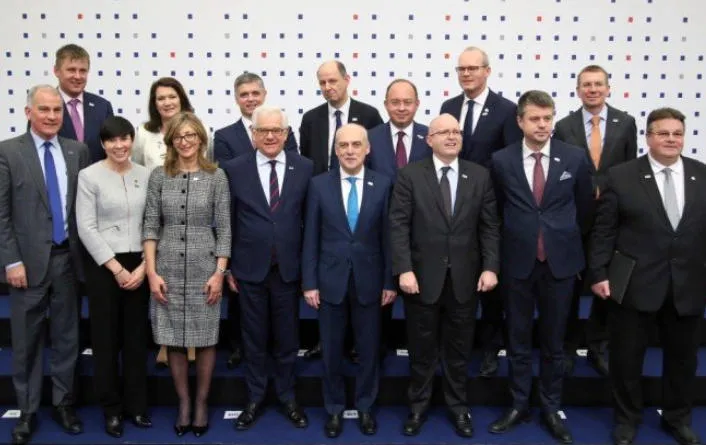
“We reaffirm our full support for Georgia’s sovereignty and territorial integrity within its internationally recognized borders,“ the group of friends of Georgia in the OSCE said in a joint statement.
“The group of friends of Georgia in the OSCE has delivered a joint statement to reaffirm their “firm support” for Georgia’s sovereignty and territorial integrity, condemn the Russian aggression and demand the release of a well-known Georgian doctor Vazha Gaprindashvili who has been in illegal detention in Georgia’s Russian-controlled Tskhinvali region for about a month.
Eleven years since the Russian military invasion of Georgia, we remain deeply concerned over the continued occupation of the territory of Georgia and underline the need for the peaceful resolution of the conflict based on full respect for the UN Charter, the Helsinki Final Act, and international law.
We call upon the Russian Federation to fulfill immediately its clear obligations under the European Union-mediated 12 August 2008 ceasefire agreement, including the withdrawal of its forces to its positions prior to the outbreak of hostilities. We also call on Russia to reverse its recognition of the so-called independence of Georgia’s Abkhazia and South Ossetia regions. We do not recognize the legitimacy of the so-called elections held in Georgia’s Abkhazia and South Ossetia regions, nor do we acknowledge their outcome.
We are concerned by the intensified provocations by Russia and the regimes in Sokhumi and Tskhinvali, including the attempted expansion of the occupied area and the building of “posts” by the so-called security forces of South Ossetia region close to Chorchana village on territory controlled by the Georgian Government. We also remain concerned over the installation of barbed wire fences and other artificial barriers along the administrative boundary line in the villages of Atotsi and Gugutiantkari, and lengthy closures of so-called crossing points in Georgia’s South Ossetia region. These actions have destabilized the situation on the ground and severely impacted the security, safety, well-being, and humanitarian conditions of people in conflict-affected areas. The recent death of Margo Martiashvili from Akhalgori district, who was deprived of the possibility to get prompt and adequate medical care, due to the closure of the so-called crossing points, is another tragic illustration of grave consequences of the continuing restrictions on the freedom of movement for the local population. We are gravely concerned by the detention of Georgian Dr Vazha Gaprindashvili in the region of South Ossetia and call for his immediate release.”
“We remain deeply concerned over the ethnic discrimination against Georgians residing in Abkhazia and South Ossetia regions and about human rights abuses, including those involving the reported use of torture, destruction of houses of internally displaced persons (IDPs), and undue restrictions on freedom of movement, residence and property. We support the voluntary return of internally displaced persons and refugees to the places of their origin in safety and dignity. We call on those in effective control to enable full and unhindered access by international and human rights organisations to Georgia’s regions of Abkhazia and South Ossetia.
We are following closely the case of the death of Georgian citizen Irakli Kvaratskhelia in arbitrary detention at the Russian Military base illegally deployed in Abkhazia region.
We condemn the killings of Georgian citizens Archil Tatunashvili, Giga Otkhozoria, and Davit Basharuli, and urge the Russian Federation, as the state exercising effective control over the Georgian regions of Abkhazia and South Ossetia, to remove any obstacles to bringing the perpetrators to justice. In this context, we reiterate our call for thorough investigation into these and other cases, and for justice to be ensured. We voice our support for Georgia’s preventive steps aimed at eradication of the sense of impunity and note the adoption of the Otkhozoria-Tatunashvili List by the government of Georgia.
We support the Geneva International Discussions (GID) as a unique and important format to address the security, human rights, and humanitarian challenges stemming from the unresolved conflict between Russia and Georgia. We note that the 50th session of the GID is scheduled for later in December 2019. We regret the lack of progress on the core issues of the discussions, including on the non-use of force, establishing international security arrangements in Georgia’s Abkhazia and South Ossetia regions, and ensuring the safe, dignified, and voluntary return of IDPs and refugees in accordance with international law.
We encourage the OSCE to work further with Georgia and other multilateral organisations to promote confidence-building measures on the ground. We also encourage Georgia to keep the Permanent Council informed of its progress in addressing developments on the ground and in further strengthening its democratic institutions and processes.
We encourage the OSCE’s engagement in the process of finding a peaceful resolution to the conflict in Georgia. We regret the closure of the OSCE mission to Georgia in 2009 and encourage the OSCE participating States to agree on the re-opening of the OSCE cross-dimensional mission in Georgia, with a monitoring capacity and the ability to operate unhindered across the administrative boundary lines. The re-opening of the mission would strengthen considerably the OSCE’s engagement in the GID and IPRMs, and in implementation of confidence-building measures.
The Group of Friends of Georgia will continue to raise awareness of the conflict and of developments on the ground, hold Russia accountable for its obligations, and advocate for the conflict’s peaceful resolution,” the statement reads.
v-if="article.gallery" v-html="article.gallery"
(adsbygoogle = window.adsbygoogle || []).push({});